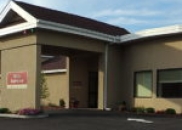Castagna Consulting Group provided Easter Seals of NH Program Management Services for the renovation of the old Queen City Inn into the new Farnum Center in Manchester, NH.
The building atop the hill at 160 Queen City Ave. has come a long way. The former Queen City Motor Inn, where some once went to feed their drug addiction, is now The Farnum Center, a place where people can find freedom from substance abuse.
Cheryl Wilkie, senior vice president of substance abuse services with Easter Seals New Hampshire’s Farnum Center, said she remembered when a man told her how attending a New Hampshire Fisher Cats game in the middle of substance abuse treatment triggered something in his brain. It triggered the notion that he simply didn’t want to live his life that way any more. The baseball game conjured up memories of attending ball games with his father, happier times. From there, the man turned the corner, Wilkie said.
Beginning in May of 2013, the Farnum Center will have increased space to accommodate more people looking to turn that same corner. The Farnum Center, a substance abuse treatment center expanded into a new space on Queen City Avenue. The center’s capacity will go from 33 to 60 beds: 40 residential beds and 20 medical detoxification rooms. The Farnum Center helps 1,400 people each year, and with the renovation work it would expand to 2,200.
The center, which fell under the Easter Seals umbrella in 2008, has been housed on Hanover Street in Manchester, but the building had become worn down and inadequate in terms of capacity. Easter Seals acquired the former Queen City Inn, which had become an eyesore and had garnered a bad reputation. Workers performed a full gut job on the building. Workers are taking a decrepit old building and turning it into an inviting and relaxing environment where people can get the treatment and help they need, officials said.
Today, the building has gone from blight to bright adding to the south Elm Street revitalization
The result is a warm, inviting place where patients are able to complete the 30 days of residential treatment.
The center offers the state’s first medical detoxification unit. Wilkie said that some people are so sick during the first days of treatment they often leave to find more drugs to make the pain go away. With medication and proper nutrition, the success rate improves because patients find it easier to make it through the first difficult days.
I appreciate that the center was built to help our neighbors with substance abuse problems, but it also has financial benefits. Wilkie said many people with money and health insurance used to leave the state to seek treatment at nicer facilities that offered medical detoxification. Now these people can stay closer to their families and jobs. It means more money stays in New Hampshire and even more money comes into the state from people out-of-state now coming here for treatment. “What we’ve been able to do is bring dignity to people in New Hampshire who want to get sober and clean in a humane atmosphere,” Wilkie said.















